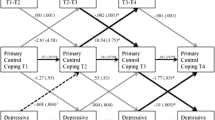Abstract
This study examined the relationship between a number of cognitive problem-solving and life event variables and depressive symptoms in a sample of non-referred grade school children. The results indicated that higher levels of depressive symptoms were associated with an external locus of control, increased levels of objective and subjective life stress, and lower performance levels on an impersonal problem-solving task. Level of depressive symptoms was also found to be inversely related to socioeconomic status as measured by father's occupation. Contrary to prediction, no consistent relationship was found between depression and interpersonal problem-solving ability.
Similar content being viewed by others
References
Albert, N., & Beck, A. T. (1975). Incidence of depression in early adolescence: A preliminary study.Journal of Youth and Adolescence, 4, 301–307.
Calhoun, L. G., Cheney, T., & Dawes, A. A. (1974). Locus of control, self-reported depression, and perceived causes of depression.Journal of Consulting and Clinical Psychology, 42, 736.
Carlson, G. A., & Cantwell, D. P. (1982). A survey of depressive symptoms, syndrome and disorder in a child psychiatric population.Journal of Child Psychology and Psychiatry, 21, 19–25.
Coddington, R. D. (1972). The significance of life events as etiologic factors in the diseases of children.Journal of Psychosomatic Research, 16, 7–18.
Doerfler, L. A., Mullins, L. L., Griffin, N., Siegel, L. J., & Richards, C. S. (1984). Problemsolving deficits in children, adolescents, and adults.Cognitive Therapy and Research, 8, 489–499.
Gotlib, I. H., & Asarnow, R. F. (1979). Interpersonal and impersonal problem-solving skills in mildly and clinically depressed university students.Journal of Consulting and Clinical Psychology, 1, 86–95.
Hollingshead, A. G., & Redlich, E. C. (1958).Social class and mental illness. New York: Wiley.
Hudgens, R. W. (1974). Personal catastrophe and depression. In B. S. Dohrenwend, & B. P. Dohrenwend (Eds.),Stressful life events: Their nature and effects (pp. 119–134). New York: Wiley.
Jacobsen, R. H., Lahey, B. B., & Strauss, C. C. (1983). Correlates of depressed mood in normal children.Journal of Abnormal Child Psychology, 11, 29–40.
Kashani, J., & Simonds, J. F. (1979). The incidence of depression in children.Journal of Psychiatry, 136, 1203–1205.
Kazdin, A. E., & Petti, T. A. (1982). Self-report and interview measures of childhood and adolescent depression.Journal of Child Psychology and Psychiatry, 23, 437–457.
Kazdin, A. E., Esveldt-Dawson, K., Unis, A. S., & Rancurello, M. D. (1983). Child and parent evaluations of depression and aggression in psychiatric inpatient children.Journal of Abnormal Child Psychology, 11, 401–413.
Kovacs, M. (1980/1981). Rating scales to assess depression in school-aged children.Acta Paedopsychiatrica, 46, 305–315.
Lefkowitz, M. M., & Burton, N. (1978). Childhood depression: A critique of the concept.Psychological Bulletin, 85, 716–726.
Lefkowitz, M. M., & Tesiny, E. P. (1980). Assessment of childhood depression.Journal of Consulting and Clinical Psychology, 48, 43–50.
Lefkowitz, M. M., Tesiny, E. P., & Gordon, N. H. (1980). Childhood depression, family income, and locus of control.Journal of Nervous and Mental Disease, 168, 732–735.
Leon, G. R., Kendall, P. C., & Garber, J. (1980). Depression in children: parent, teacher, and child perspectives.Journal of Abnormal Child Psychology, 8, 221–235.
Nowicki, S., & Strickland, B. R. (1973). A locus of control scale for children.Journal of Consulting and Clinical Psychology, 40, 148–155.
Paykel, E. S. (1974). Life stress and psychiatric disorder. In B. S. Dohrenwend, & B. P. Dohrenwend (Eds.),Stressful life events: Their nature and effects (pp. 135–149). New York: Wiley.
Platt, J. J., & Spivack, G. (1977).Measures of interpersonal problem-solving for adults and adolescents. Unpublished manuscript, Hahnemann Medical College and Hospital, Philadelphia.
Richard, B. A., & Dodge, K. A. (1982). Social maladjustment and problem-solving in schoolaged children.Journal of Consulting and Clinical Psychology, 50, 226–233.
Schneiderman, R. H., Reber, A. S., & Hainline, L. (1978). Children's anagram solutions as an index of linguistic and cognitive development.Child Development, 49, 765–772.
Schulterbrandt, J. G., & Raskin, A. (Eds.). (1977).Depression in childhood: Diagnosis, treatment, and conceptual models. New York: Raven Press.
Schwartz, M., Friedman, R., Lindsay, R., Narroi, H. (1982). The relationship between conceptual tempo and depression in children.Journal of Consulting and Clinical Psychology, 50, 488–490.
Shure, M., & Spivack, G. (1972). Means-ends thinking, adjustment, and social class among elementary school-aged children.Journal of Consulting and Clinical Psychology, 38, 348–353.
Siegel, J. M., Platt, J. J., & Peizer, S. B. (1976). Emotional and social real-life problem-solving thinking in adolescent and adult psychiatric patients.Journal of Clinical Psychology, 32, 230–232.
Spivack, G., Platt, J. J., & Shure, M. B. (1976).The problem-solving approach to adjustment. San Francisco: Jossey-Bass.
Tesiny, E. P., & Lefkowitz, M. M. (1982). Childhood depression: A six-month follow-up study.Journal of Consulting and Clinical Psychology, 50, 778–780.
Author information
Authors and Affiliations
Additional information
This research is based on the first author's master's thesis submitted under the supervision of the second author to the Department of Psychology, University of Missouri-Columbia.
Rights and permissions
About this article
Cite this article
Mullins, L.L., Siegel, L.J. & Hodges, K. Cognitive problem-solving and life event correlates of depressive symptoms in children. J Abnorm Child Psychol 13, 305–314 (1985). https://doi.org/10.1007/BF00910650
Revised:
Issue Date:
DOI: https://doi.org/10.1007/BF00910650




